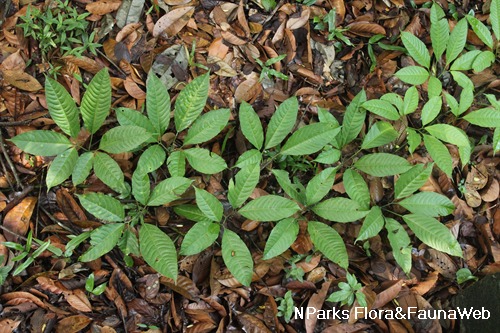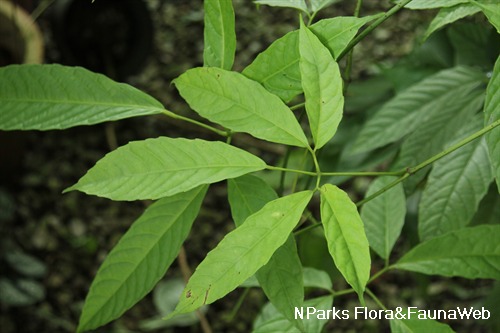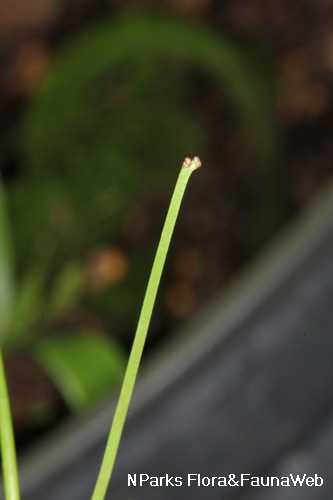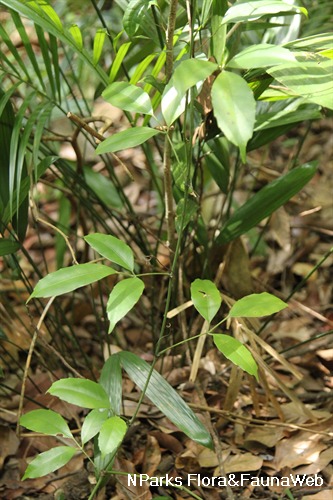
Back
Tetrastigma leucostaphylum (Dennst.) Alston
| Family Name: | Vitaceae |
| Synonyms: | Tetrastigma rafflesiae auct. non (Miq.) Planch. <1> |
Name
Classifications and Characteristics
| Plant Division | Angiosperms (Flowering Seed Plants) (Dicotyledon) |
|---|---|
| Plant Growth Form | Climber |
| Lifespan (in Singapore) | Perennial |
| Mode of Nutrition | Autotrophic |
Biogeography
| Native Distribution | Bangladesh, Bhutan, India, Nepal, Sri Lanka, Indochina, Myanmar, Thailand, Peninsular Malaysia, Singapore, and Java |
|---|---|
| Native Habitat | Terrestrial (Primary Rainforest, Freshwater Swamp Forest) |
| Preferred Climate Zone | Tropical |
| Local Conservation Status | Native to Singapore (Critically Endangered (CR)) |
Description and Ethnobotany
| Growth Form | It is a woody climber. |
|---|---|
| Foliage | Its spirally arranged, stalked leaves bear 3–7 stalked leaflets. The terminal leaflet is lance-shaped and 14–21 by 4–9.5 cm, while the lateral leaflet is lance-shaped and 6–14 by 2.5–6.5 cm. Both the leaflet types have toothed margins. |
| Flowers | The plant is dioecious with male and female flowers borne on separate plants. Its stalked flowering shoot bears male flowers that are up to 2 mm long, and female flowers that are up to 5 mm long. |
| Fruit | Its fruits are round berries, 15–20 mm wide, and contain 1–2 seeds each. Its seeds are oblong and up to 12 by 6 mm. |
| Habitat | It grows on the fringe of lowland dipterocarp forests. It occurs locally at Nee Soon Swamp Forest. |
| Associated Flora | It is the host plant on which Rafflesia species parasitise on. The flower buds of Rafflesia species could be seen along the stems of infected plants. These buds eventually mature and bloom into one of the world's largest flowers. Rafflesia hassletii is known to parasitise this species. |
| Associated Fauna | Its flowers are pollinated by bees, and its fruits and seeds may be eaten and dispersed by birds. |
| Taxonomy | Plants in forests or natural areas of Singapore thought to be Tetrastigma rafflesia are now known to be Tetrastigma leucostaphylum. |
| Cultivation | It can be propagated from seed or stem cuttings. |
| Etymology | Greek tetra, four; Latin stigma, mark, referring to the 4-lobed stigma; Greek leukos, white; Greek staphyle, a bunch of grapes, the reference to the fruits. |
| Ethnobotanical Uses | Medicinal: A poultice made from the leaves is used for boils and ague. |
Landscaping Features
| Landscaping | It may be suitable for parks, for growing on trellises and pergolas. |
|---|---|
| Desirable Plant Features | Ornamental Foliage |
| Landscape Uses | General, Parks & Gardens, Small Gardens, Trellis / Arbour / Pergola |
Fauna, Pollination and Dispersal
| Fauna Pollination Dispersal Associated Fauna | Bird-Attracting (Fruits) |
|---|---|
| Pollination Method(s) | Biotic (Fauna) |
| Seed or Spore Dispersal | Biotic (Fauna) |
Plant Care and Propagation
| Light Preference | Full Sun, Semi-Shade |
|---|---|
| Water Preference | Moderate Water |
| Plant Growth Rate | Moderate |
| Rootzone Tolerance | Moist Soils, Well-Drained Soils, Fertile Loamy Soils |
| Transplanting Tolerance | Good |
| Maintenance Requirements | Moderate |
| Propagation Method | Seed, Stem Cutting |
Foliar
| Foliage Retention | Evergreen |
|---|---|
| Mature Foliage Colour(s) | Green |
| Mature Foliage Texture(s) | Leathery |
| Foliar Type | Compound (Trifoliate) |
| Foliar Arrangement Along Stem | Alternate |
| Foliar Attachment to Stem | Petiolate |
| Foliar Shape(s) | Non-Palm Foliage (Lanceolate) |
| Foliar Venation | Pinnate / Net |
| Foliar Margin | Serrate / Toothed |
Floral (Angiosperm)
| Flower & Plant Sexuality | Unisexual Flowers , Dioecious |
| Flower Colour(s) | Cream / Off-White |
|---|
| Flower Grouping | Cluster / Inflorescence |
| Flower Symmetry | Radial |
Fruit, Seed and Spore
| Fruit Classification | Simple Fruit |
|---|---|
| Fruit Type | Fleshy Fruit , Non-Accessory Fruit |
References
| References | <1> Veldkamp, J.F.. (2008). The correct name for the Tetrastigma (Vitaceae) Host of Rafflesia (Rafflesiaceae) in Malesia and a (not so) new species. Reinwardtia 12(4): 261–265. <2> Lindsay, S. et al. (2022). Flora of Singapore: Checklist and bibliography. Gardens’ Bulletin Singapore 74(Suppl. 1): 3–860. |
|---|
Image Repository
Others
| Master ID | 31547 |
|---|---|
| Species ID | 5946 |
| Flora Disclaimer | The information in this website has been compiled from reliable sources, such as reference works on medicinal plants. It is not a substitute for medical advice or treatment and NParks does not purport to provide any medical advice. Readers should always consult his/her physician before using or consuming a plant for medicinal purposes. |




